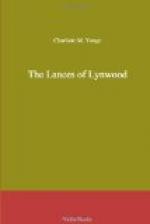Clarenham was then compelled to dismount from his horse, and to, first one foot, and then the other, upon the block, where a broad red-faced cook, raising his cleaver, cut off the golden spurs. Sir John Chandos, as Constable of Aquitaine, then came forward, and, taking the shield from the arm of Clarenham, gave it, reversed, into the hands of one of the heralds, who carried it away. The belt, another token of knighthood, was next unbuckled, and Chandos, taking the sword, broke it in three pieces across his knee, saying, “Lie there, dishonoured steel!” and throwing it down by the spurs. Lastly, the helmet, with the baronial bars across the visor, was removed, and thrown to the ground, leaving visible the dark countenance, where the paleness of shame and the flush of rage alternated.
“And now, away with the traitor, away with the recreant Knight! out upon him!” cried in a loud voice Sir John Chandos, while the shout was taken up by a deafening multitude of voices—in the midst of which the degraded Knight and landless Baron made his way to the gate, and, as he passed out, a redoubled storm of shouts and yells arose from without.
“Out upon the traitor!” cried Harry of Lancaster with the loudest. “Away with him! But, Edward, and you too, Arthur, why shout you not? Hate you not traitors and treason?”
“I would not join my voice with the rabble,” said Edward, “and it makes me sad to see knighthood fallen. What say you, Arthur?”
“Alas! he is my mother’s kinsman,” said Arthur, “and I loved his name for her sake as for that of Agnes too. Where is Agnes?”
“In the Convent of the Benedictine nuns,” said Edward. “But in your ear, Arthur, what say you to our plan that she shall be heiress of her brother’s lands, on condition of her wedding—guess whom?”
“Not mine uncle! Oh, Lord Edward, is it really so? How rejoiced old Ralph would be!”
“Speak not of it, Arthur—it was my mother who told me, when Agnes craved permission to go to the Convent, and I feared she would become one of those black-veiled nuns, and I should never see her more.”
“Where is my uncle?” asked Arthur, gazing round. “I thought he was standing by the Lady Princess’s chair—”
“He went to speak to Sir John Chandos but now,” said Prince Henry, “but I see him not. Mark! what a lull in the sounds without!”
In fact, the various cries of execration which had assailed Fulk Clarenham on his exit from the gates of the Castle, after sounding more and more violent for some minutes, had suddenly died away almost into stillness—and the cause was one little guessed at within the court. The unhappy Fulk was moving onwards, almost as in a dream, without aim or object, other than to seek a refuge from the thousand eyes that marked his disgrace, and the tongues that upbraided him with it; but, in leaving the court, he entered upon a scene where danger, as well as disgrace, was




